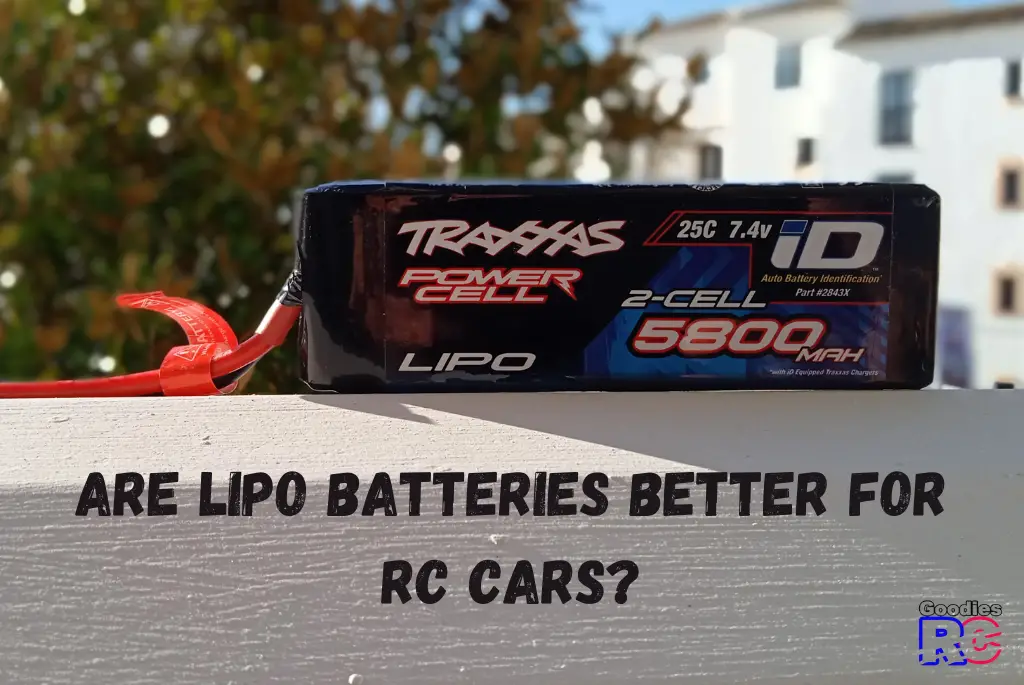Lithium polymer or “LiPo” batteries can be the most efficient upgrade to your RC car. But they’re a lot different from other RC batteries and need to be used in a very particular way.
LiPo batteries are better for RC cars because they have a high energy density and consistent voltage. They also produce a high voltage of around 3.7v (average) per cell. They charge and discharge efficiently and are safe to recycle. You can recharge LiPo batteries up to 500 times before they weaken.

Even though NiMH batteries can also be recharged hundreds of times, it loses a bit of capacity every time, unlike LiPo batteries.
So reliable, powerful voltage, and small size-to-energy ratio are the biggest reasons LiPo batteries are the most preferred choice for RC cars. But here are a few more advantages.
They’re very durable and won’t break as easily as other batteries if you smash your RC into a wall or drop it onto cement from a high jump.
They don’t have the “memory effect” that NiMh and NiCad batteries have, so the capacity of the battery doesn’t decrease over time.
LiPo batteries are made to fit RC cars perfectly. Manufacturers are able to create any shape when designing the battery so they make perfect rectangular-shaped batteries to slot into the RC chassis without wasting any space.
These batteries can release their energy very quickly to deliver massive energy to your RC for maximum acceleration and RPM, this is why LiPo batteries are so good for RC drones.
LiPo batteries don’t weigh as much as other batteries, so the RC car benefits from faster acceleration, speed, and battery operational time.
Last, they have a higher capacity (mAh) compared to other batteries of the same physical size.
(Amazon link)
Are LiPo Batteries Better Than NiMH?
LiPo batteries are better than NiMH because LiPo batteries are more powerful, efficient, and consistently powerful. They last longer during operation and don’t drop in voltage until they’re almost completely flat. NiMH loses voltage as the batteries run down.
Do LiPo Batteries Make RC Cars Faster?

LiPo batteries make your RC car faster because they discharge quicker to deliver more power than other batteries. They consistently produce around 3.7v per cell, making a simple 2S (2 cells) setup capable of pushing out 7.4v through the motor for fast acceleration and top speeds.
Make sure to upgrade your motor to accommodate the powerful batteries and consider buying aluminum gears to handle the torque.
For a thorough examination of how LiPo batteries affect the speed of your RC car, see this article: Will A LiPo Battery Make My RC Car Faster?
How Long Do LiPo RC Batteries Last?
LiPo batteries last 150 to 500 cycles before they start to deteriorate. 150 cycles will take three years if you run the battery down twice a week. But in most cases, LiPo batteries have a lifespan of around 3 to 5 years.
They don’t have a longer lifespan than other batteries, but they’re still preferred because they have more reliable and consistent power during their shorter life.
What Do 2S, 3S, and 6S LiPo Mean?
The S rating is the number of connected 3.7v cells there are in a LiPo battery pack. 2S means there are 2 cells totaling 7.4v, 3S has 3 cells and 11.1v, 4S has 4 cells and 14.8v, and 6S has 6 cells and 22.2v of power.
The higher the voltage, the faster your RC car will run. Also, the more cells there are, the higher the total capacity of the pack, so more cells also equate to a higher energy capacity. This is indicated by the milliamp hours rating (mAh).
Charging Advice For LiPo Batteries
LiPo batteries need chargers that supply a constant current/voltage while charging. Manufacturers label these chargers with CC/CV to indicate LiPo charging capabilities.
You will damage a LiPo battery if you charge it with a NiMH or NiCd battery charger because they use a charging method called pulse charging, which is not compatible with LiPo batteries.
Always balance-charge your LiPo batteries. There’s a balance-charge mode on your LiPo charger, make sure it’s activated. The only exception is if you’re running a single-cell LiPo battery, which is pretty rare, but if you are, there’s only one cell to charge and nothing to balance.
Discharge your LiPo batteries before you store them away to avoid cell degradation and to make them safer during storage. Sometimes the battery will swell up if they’re stored with a charge in them. So drain the batteries to just above 3v per cell during downtimes. You might even have a “storage charge mode” to run the batteries down to the right level.
During normal operation, you don’t want to go all the way down to 3v, so adjust the low-voltage cut-off to around 3.3v per cell to cut the throttle off and avoid low voltages.
Don’t forget to switch the RC off after the low-voltage cut-off kicks in. If the RC has lights, they will drain the battery. Also, the cut-off only stops the throttle, not the steering servos. So switch everything off when the cut-off occurs.
(Amazon link)
Store your LiPo batteries in a cool, dry space after they’ve cooled down. Make sure that there’s nothing flammable around the battery in case it spontaneously combusts, although this is very rare, it’s possible. Also, don’t charge them if they’re hot. Let them cool first. Obviously, don’t leave them in direct sunlight or in any hot environment like your car.
Check out my article: How, Where, And When To Store Your RC Trucks
Avoid buying second-hand LiPo batteries because they might be damaged and have a shorter lifespan than expected lifespan.
Rebalance the batteries with the charger every 3 to 6 months of storage to avoid them draining down to an unsafe voltage.
You can throw LiPo batteries in with the rest of the trash but ensure to completely discharge them first. They are a fire hazard if not discharged before disposal.
In Summary
LiPo batteries are better for RC cars than any other batteries. They are more powerful and deliver a consistent voltage throughout their operation. Lipos are perfectly shaped to fit an RC chassis while taking up minimal space. They deliver more energy to electric motors for faster acceleration and top speeds.
Of course, LiPo batteries are more expensive than other options, but they’re well worth the money if you have the option.
If you found this article helpful, you might be interested in these articles;
